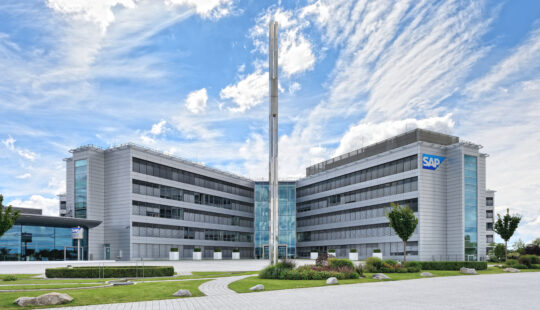A recent survey revealed that for 51% of investors, the “S” element of their environmental, social, and governance (ESG) investment strategies is essentially a check-the-box exercise. Since it is the most difficult to analyze and integrate, companies have mainly focused on the “E” — or climate change mitigation — as the leading criteria for their investment decisions.
However, over the past two years, the pandemic has had significant socioeconomic implications that exacerbated inequalities worldwide. The world and business realm are changing in response: no longer is it enough for companies to focus on profit alone, they also need to focus on creating a positive social impact.
As demonstrated in 2021 SAP Integrated Report, businesses have started to understand that financial and social performance are no longer mutually exclusive. Companies cannot just look at business activities from a “do no harm” perspective. Instead, they must create and integrate positive economic and social impact. Through strategic corporate social responsibility (CSR) and by implementing solid reporting methods, it is indeed possible to further the “S” in ESG.
I recently sat down with Alexandra van der Ploeg, head of SAP CSR, and Deirdre White, CEO of PYXERA Global, the nonprofit implementation partner of our flagship SAP Social Sabbatical program. We discussed the importance of the social elements of ESG and how SAP and PYXERA Global are implementing these aspects within their respective organizations, along with the world’s current ESG trends.
When it comes to environmental and social issues, businesses are the innovators with the power to trigger significant social change in partnership with social enterprises.
“Traditional CSR has evolved into strategic CSR, which accomplishes both strategic business and social goals,” van der Ploeg explained. “Companies must work toward striking the right balance of economic, environmental, and social components, because if they don’t focus on people along with planet, they are unlikely to achieve desired long-term impact.”
White shared her perspective at PYXERA Global: “The ‘S’ is about the people and the community, and the ‘E’ and ‘G’ do not matter if we aren’t focused on that ‘S.’ You can count all the carbon you want and you can look at board dynamics and other governance things, but if they are not actually having a positive impact on people and community, then those are meaningless metrics.”
SAP’s evolved CSR strategy powers equitable access to economic opportunity by accelerating social businesses, while also focusing on building future skills and collaborating for sustainability. Efforts in these areas have led to a software industry leading score of 91 for Corporate Citizenship in the most recent Dow Jones Sustainability Index, which is significantly above the industry average score of 20. This is a significant achievement, as it illustrates that not only are we impacting our target communities, but also positioning SAP as an exemplar of how to integrate the “S” of ESG to build a deeper, more cohesive sustainable impact.
“The social enterprise sector is made of key actors in driving change in the world, and they are the fundamental innovators when it comes to environmental and social issues,” van der Ploeg affirms. “From an SAP perspective, we have to support them to grow and scale, just like we do with our customers. If we can help corporations run better, we can help social enterprises run better, and we do this through pro bono consulting.”
The SAP Social Sabbatical initiative is a signature pro bono consulting program from SAP CSR. It sends high-performing employees into emerging economies to support social entrepreneurs and nonprofit organizations. Participants take on the role of business consultants, providing their skills and talents to create solutions for the real-world challenges that the participating social businesses are facing. This ultimately creates impact longevity and capacity building for the transformational work that these organizations do on a day-to-day basis.
To date, SAP employees have contributed more than 359,000 pro bono consulting hours to help over 450 non-profits and social enterprises across 52 countries. PYXERA Global, with White, has been partnering with the SAP Social Sabbatical program since its inception 10 years ago. As an industry leader in this space, PYXERA Global supports other corporations like SAP to create immersive pro bono consulting experiences.
“The reason we do pro bono programs at PYXERA Global is because current and future leaders of the world’s largest corporations are fundamentally changed by the experience that they have,” White said. “They are bringing their brilliance, their talents, and their business skills to help solve for a problem that they don’t give that much thought to normally in their daily lives. It changes the way they think, and that education that happens, that’s how we’re going to take on these big challenges. This is why I love SAP Social Sabbatical and programs like it.”
The pro bono consulting impact for employee participants goes beyond working closely with organizations focused on solving the world’s biggest problems, it also significantly develops employees as leaders. In fact, from a recent long-term impact study that SAP conducted, 74% of employees report a long-term impact on their professional careers, with the top reported benefits being employees gained a new perspective and different way of thinking, increased confidence, and improved networking.
At SAP, pro bono consulting is positioned as a learning opportunity, where employee growth, development, and skill building are as much a part of the experience. As van der Ploeg stated, “We looked at 10 years of work together with PYXERA Global, and what I found interesting was that employees who participated have said that both on a professional, as well as a personal level, it was a game-changer.”
From our learnings about the positive impacts that pro bono consulting provides for positive long-term community impact, leadership development, and business success, one sentiment rings true: continuing to bring the social elements to the forefront of the ESG conversation cannot be siloed and must be a priority. Companies, social businesses, and individual employees can get involved to work together to achieve sustainable development through in-person and virtual pro bono consulting. Both now and in the future, it is essential that everyone plays their part.
Want to learn more? Watch the recording of the full conversation with van der Ploeg and White here.
Additionally, two upcoming speaker sessions hosted by SAP CSR will continue to explore pro bono consulting, impact measurement, and leadership and learning development:
- Delivering Lasting Social Impact and Business Value: 10 Years of Insights
October 27, at 10:00 a.m. ET; register here - Learning and Leadership Through Pro Bono Consulting
November 17, at 10:00 a.m. ET; register here
Hemang Desai is global program director for SAP Corporate Social Responsibility.



